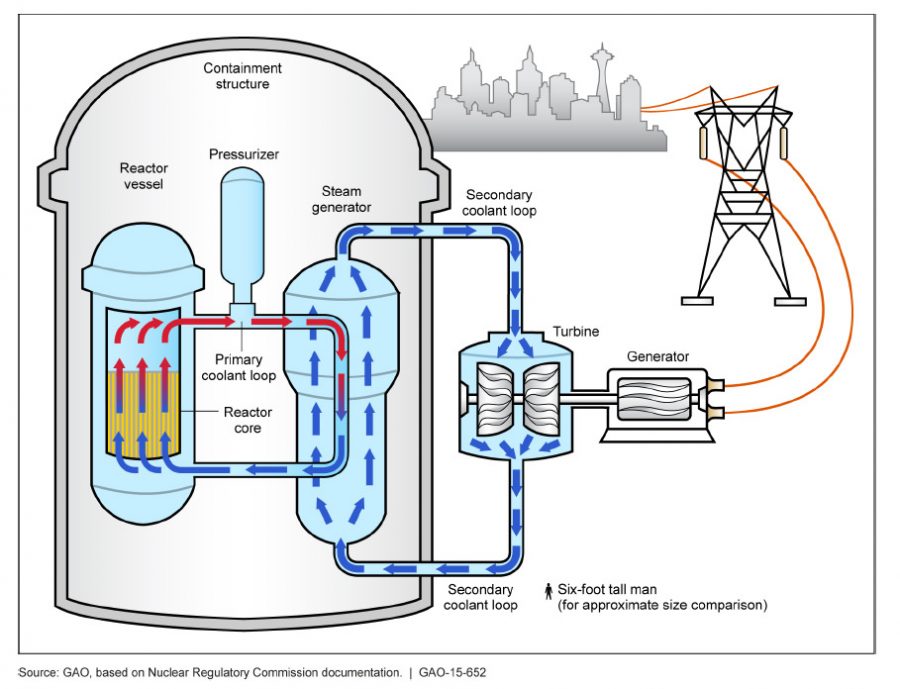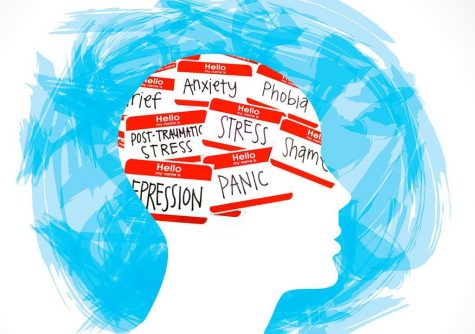Pros and Cons of Nuclear Energy
Inside a nuclear reactor.
Although widely controversial, nuclear energy is the only source of energy that can easily replace fossil fuels because of its high 91% efficiency rate. Electricity is produced this way through nuclear fission, the splitting of Uranium atoms. As with every non-renewable energy source, nuclear energy has its pros and its cons, but it may be America’s best option in fighting against climate change today.
The history of nuclear accidents is no secret. Chernobyl had 31 fatalities and up to 4,000 deaths from radiation during the years after; Fukushima had 573 fatalities (End Coal). While it is true that nuclear reactions can be dangerous when not controlled properly, there are far more deaths related to air pollution caused by coal-fired power plants. Carbon dioxide released from the burning of coal causes 13,000 premature deaths, 20,000 heart attacks, and 1.6 million days of work lost in the US every single year (Greening Forward). On a global level, 670,000 people die of coal-related pollution in China, up to 115,000 in India, and 23,000 in Europe yearly (End Coal). Burning coal is also proven to result in asthma, lung cancer, COPD, bronchitis, and emphysema (PSR). Not only is coal a major contributor to health risks from air pollution, but the fracking of natural gas is also known for its links to blood cancer, respiratory problems, and severe water contamination. According to the American Chemical Society, natural gas facilities lose about 100 billion cubic feet of natural gas every year” (Environmental Science and Technology).
730 tons of carbon dioxide are released into the atmosphere every second, resulting in 23 billion tons every year (Ecolo). If the United States switched to operating on nuclear plants, we would become a much more energy-efficient and green nation. Fossil fuels are limited and only predicted to last us another 100 years, while the abundance of uranium will be around for another 200. Yes, it is true that nuclear power plants are struggling to find a way to permanently dispose of waste, but it is currently being kept in large underground vaults that is safe to human health and unable to contaminate the ground. Some may make the claim that nuclear plants are too expensive, but the US is currently saving $12 billion every year in energy costs by using nuclear energy (Nuclear Energy). While the initial cost of building these plants, like any other plant, can be expensive, the actual production and upkeep is cheap. The United States has passed multiple legislations such as the US Nuclear Regulatory Commission, Price Anderson Act, and Energy Policy Act to ensure that nuclear production in the United States is under control. Since Chernobyl, there have been few to no fatalities related to nuclear energy, yet the amount of deaths because of CO2 emissions continues to grow. Nuclear energy is currently the most efficient way for the United States to eliminate its impact on global warming until a renewable option has been discovered and can completely replace our current use of fossil fuels.
https://greeningforward.org/nuclear-power-the-good-the-bad-and-the-beautiful/
http://www.psr.org/assets/pdfs/coal-assault-chapter-3.pdf
http://ecolo.org/documents/documents_in_english/BENEFITS-of-NUCLEAR.pdf
https://nuclear-energy.net/advantages-and-dissadvantages-of-nuclear-energy.html












Chris Murray • May 16, 2018 at 10:25 am
Even using mainstream science* to estimate casualties, Chernobyl will likely cause 50,000 eventual fatal cancers and Fukushima about 5,000. The total casualty count from nuclear is likely to be about 100,000 fatal cancers. While the risks of nuclear disaster may be relatively low in well managed countries, that is not the case for other countries. Worse, nuclear reactors and their storage ponds are big fat targets for terrorists anywhere, anytime, making nonsense of accident-probability estimates, and are a colossal liability in wartime.
While the peacetime casualties from fossil fuels may be far worse than nuclear, two wrongs don’t make a right. The casualties from nuclear – 100,000 deaths – are bad enough. We need to move to the safest energy sources, and wind and solar deaths are estimated (even by pro-nuclear sources) to be about one tenth of nuclear’s.
*The Linear Non-Threshold model (LNT). This is often criticised by nuclear lobbyists, but since they themselves use it to estimate fossil fuel deaths, it should logically be used to estimate radiation deaths.